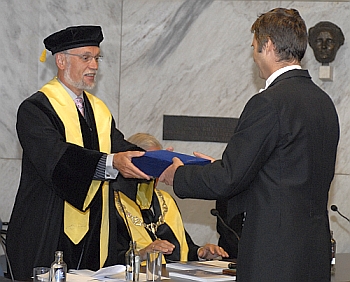NETSCAPE: Cities and Global Corporate Networks
On June 5, Ronald Wall has defended his PhD thesis entitled “<link erim events _blank>NETSCAPE: Cities and Global Corporate Networks”.
 This dissertation is focused on empirically showing that the fate of cities is strongly related to their hierarchic importance within global corporate networks. These connections concern the shares held between multinational headquarters and their thousands of subsidiaries around the world. It is shown that urban development should not only be concerned with economic development within the municipal boundaries but should compliment this with understanding and improving the number and diversity of connections with other cities worldwide. In this way in future a more effective urban development can be created which unites local and global knowledge. The study is based on several advanced network analysis techniques and most importantly, unique datasets on corporate networks. Furthermore, it is well founded in economic network literature.
This dissertation is focused on empirically showing that the fate of cities is strongly related to their hierarchic importance within global corporate networks. These connections concern the shares held between multinational headquarters and their thousands of subsidiaries around the world. It is shown that urban development should not only be concerned with economic development within the municipal boundaries but should compliment this with understanding and improving the number and diversity of connections with other cities worldwide. In this way in future a more effective urban development can be created which unites local and global knowledge. The study is based on several advanced network analysis techniques and most importantly, unique datasets on corporate networks. Furthermore, it is well founded in economic network literature.
It is shown that corporate activity strongly transcends the boundaries of cities and nations, revealing that the business networks are truly global, and are the integrating factor between nations. It is also shown that these networks remain highly uneven and that the vast majority of the world's cities and nations hardly participate with this system at all. In this light, the study empirically shows that the world is still far from flat and is instead highly polarized. The study reveals that only a few hub cities hold the majority of connections and that these are the preferential places for business location.
Interesting to the Netherlands is that about 70% of all corporate connectivity goes beyond the nation's borders. This could imply that the economic development of The Netherlands will also depend on strategies to develop economic activities between Dutch cities and various cities around the world. At the municipal level it means that urban development should be equally based on understanding and developing economic collaboration and competition with other cities.
About Ronald Wall:
Ronald Wall was born in Harare, Zimbabwe on the 27th of November 1966. He grew up in South Africa between 1971 and 1987. From 1987 onwards he has resided in The Netherlands. In 1991 he obtained his Bachelors degree at the Willem de Kooning Academy of Arts in architectural design, and commenced his education at the Rotterdam Academy of Architecture and Urban Planning, where he received his Masters degree in architecture and urban planning in 1998. During the period of 1991 to 2001 he has worked for urban planning offices like OMA (Rem Koolhaas) and has been project leader for West 8 (Adriaan Geuze) and MVRDV (Winy Maas). In 1997 he received a commendation from Nelson Mandela for his project Housing Generator, concerning township development in South Africa. He has also received several design awards such as the Rotterdam Design Prize and the International Design Award in 1996. In 2000 he was commissioned by the Rijksplanbureau (RPB/VROM) to execute a one year research on Healthy Cities.
Between 2003 and 2008 has been scientific coordinator of a Dutch national research project called ‘Network of Networks’ for the Dutch Organization of Scientific Research (NWO). Ronald Wall has between 2001 and 2009 been professor in urban planning at the Berlage Institute and the Rotterdam and Amsterdam Academies of Architecture and Urban Planning. In 2006 and 2007 he carried out a four year contracted research for The Netherlands Environmental Assessment Agency (RIVM/MNP) concerning urban development in relation to world city networks. Similarly in 2007 he carried out research for the municipality of Almere concerning the position of this city within national and global corporate networks, in which the results were used to define a future urban vision of Almere 2020. The central interests of his work are statistics, network analysis, geographic information system (GIS) analysis and urban planning and design techniques. He has been published in some 30 journals, research reports, books and conference proceedings in the fields of architecture, urban planning and economic geography – for instance the Journal of Economic and Social Geography; Volume Planning Journal of University of Columbia/AMO/Archis; the book Foreign Metropolitan Region Development of Jiao Tong University Shanghai; and the urban development journal 306090 of Princeton University.
 Abstract:
Abstract:
Today the existence of the ‘network society’ is often asserted. However, there is a lack of empirical understanding of what these networks actually are, especially concerning networks between cities worldwide. Therefore, this study contributes to economic geography because it is empirically based on actual data concerning global multinational networks. Based on this, the network characteristics of temporality, structure, scale, competition and performance are explored using network analysis techniques. In the temporal study the historical process of network formation is discussed. In the study on structure the contemporary worldwide corporate network is empirically exposed. In this, the hierarchies, interdependencies and distribution of the network is revealed. For instance, it is demonstrated that the majority of corporate activity takes place ‘between’ cities and not ‘within’ their municipal boundaries. The study on corporate scale shows how differences in firm types (global, European and Dutch), will reveal variations in city hierarchies and interdependencies. In the competition study a new measure has been introduced to assess competition based on the economic ties between cities. The study on network performance shows that although the reach of corporate activity between nations is global, the scope of this activity remains particularly constrained between nations of the developed world. Hence, contrary to popular belief, the corporate world is not flat but highly polarized. Based on this, it is shown that network hegemony is strongly associated with the global competitivity levels of nations. This study demonstrates the utility of network analysis to understand cities within an increasingly global world - in which the methods, techniques and results can be of interest to scientists, policymakers, planners and developers alike.
More Information
Pictures of the Event
Full Text of the Dissertation


